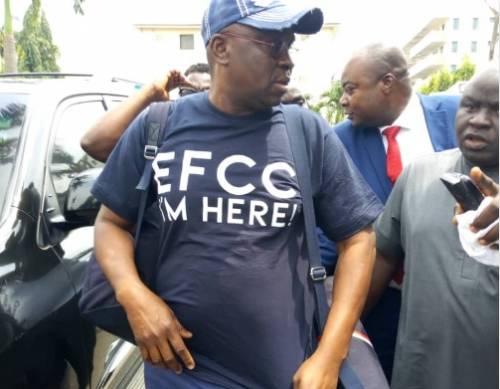EFCC Unmasks 18 Sitting Governors Under Probe: Awaiting Tenure End for Justice

The Economic and Financial Crimes Commission (EFCC) has renewed its commitment to fighting corruption and naira abuse across Nigeria. This development was outlined by the Commission’s Chairman, Ola Olukoyede, who emphasized the agency’s current focus on investigating high-profile individuals, particularly state governors, while also leading a nationwide campaign against the mutilation and spraying of naira notes at public gatherings.
18 Governors Under Active Investigation
Olukoyede revealed that 18 of Nigeria’s 36 sitting governors are presently under EFCC investigation. Although these governors benefit from constitutional immunity and cannot be prosecuted while in office, the Commission has concrete plans to commence legal proceedings once their terms conclude. These efforts are underpinned by a landmark Supreme Court judgment delivered on November 15, 2024, which dismissed a legal challenge brought by 19 state governors. The suit had contested the constitutionality of federal anti-corruption institutions, including the EFCC, The Independent Corrupt Practices and Other Related Offences Commission (ICPC), and the Nigerian Financial Intelligence Unit (NFIU).
In its ruling, the Supreme Court affirmed the authority of the National Assembly to enact anti-corruption legislation and confirmed that such laws are binding on all states, regardless of local statutes. This judgment effectively reinforces the EFCC’s mandate and grants it the legal authority to investigate even serving governors, providing full jurisdiction wherever federal agencies operate.
International Fallout: Governor Arrested in the UK
The EFCC Chairman cited a notable case involving a former Nigerian governor who, immediately after leaving office, fled to the United Kingdom to avoid arrest. During a birthday celebration at a hotel in London, this ex-governor began spraying £50 and £10 notes, an act that drew the attention of hotel management and subsequently led to police intervention.
The Metropolitan Police arrested him on the spot. Despite attempts by his associates, including two serving governors, to secure his release, the British authorities proceeded with prosecution. He was eventually convicted and imprisoned, though he later received a pardon. This incident highlighted the international consequences of currency abuse, which is treated as a criminal offense in jurisdictions where financial decorum is strictly enforced.
Cultural Justifications Rejected as Enforcement Tightens

Image Credit: Unsplash
Olukoyede firmly rejected the argument that spraying, stamping, or mutilating the Naira is a cultural tradition. He stated that the Naira is a national symbol, representing Nigeria’s sovereignty and dignity. According to him, such acts of abuse create a financial burden on the Central Bank of Nigeria (CBN), which must frequently replace defaced notes.
In response to these challenges, the EFCC has established a Task Force on Dollarisation and Naira Abuse. This initiative, in collaboration with the CBN, aims to raise public awareness and enforce the law through high-profile prosecutions, including cases involving celebrities and public officials. The Commission has called on the entertainment industry, particularly musicians and influencers, to take responsibility for educating their followers on the illegality and social cost of abusing the national currency.
Recovery of Public Funds and Asset Repurposing
Beyond enforcement, the EFCC is actively involved in prevention and recovery. One of the Commission’s newest units, the Fraud Risk Assessment Unit, successfully prevented the theft of N10 billion within its first year of operation. Furthermore, the agency has recovered N100 billion in public funds, which has been redirected into strategic initiatives such as the National Education Loan Fund (NELFund) and the Consumer Credit Scheme (Credicorp).
Recovered physical assets have also been repurposed for national development. A confiscated private university in Kaduna State has been converted into the Federal University of Applied Sciences, Kachia, while a seized property in Bayelsa State now serves as a skill acquisition centre and liaison office for the Niger Delta Development Commission (NDDC). To support public enlightenment, the EFCC also operates a dedicated anti-corruption radio station, 97.3 FM, which broadcasts educational content across Nigeria.
Legal Obstacles and Delayed Prosecutions
Despite its successes, the EFCC continues to face significant hurdles in prosecuting politically exposed persons (PEPs). Many of these individuals have the resources to engage top-tier legal teams, using procedural delays to stall cases—some of which have been in court for over a decade. These tactics complicate the judicial process and prolong the resolution of high-profile corruption cases, even when evidence is substantial.
Tackling Crypto Crimes and Online Fraud

Image Credit: Unsplash
The EFCC’s mandate also includes addressing emerging forms of economic crime. In Lagos, the Commission arrested 194 foreign nationals involved in illegal cryptocurrency activities. Out of this number, 168 have already been convicted, underscoring the agency’s resolve in confronting digital financial misconduct. The EFCC Chairman expressed concern over the growing prevalence of internet fraud, commonly known as ‘Yahoo Yahoo’, warning that such activities have severely tarnished Nigeria’s international image and contributed to the diminishing global value of Nigerian passports.
National Orientation Agency Aligns with EFCC
Supporting the EFCC’s campaign, the National Orientation Agency (NOA), led by Mallam Lanre Isa-Onilu, echoed the sentiment that naira abuse is both unlawful and unethical. The NOA emphasized the need to treat the Naira as a national asset, not as a display prop or object of prestige. This perspective aligns with the National Values Charter, which promotes civic responsibility, patriotism, and respect for national symbols as essential pillars of national unity.
Recommended Articles
Anti-Graft Bombshell: EFCC Chief Reveals Probe of 18 Sitting Governors

The EFCC is actively investigating 18 serving governors, with Chairman Ola Olukoyede affirming commitment to prosecute o...
Witness links SunTrust Bank executives, Aisha Achimugu to suspicious cash-based forex transactions
Two SunTrust Bank Ltd. executives are facing six counts of money laundering involving $12 million.
EFCC's spokesperson, NIPR president named among 50 top PR professionals in Nigeria

Mr Oyewale and other honorees, will be decorated at an elaborate ceremony in Lagos on Friday.
Alleged N6.9bn fraud: EFCC to appeal Fayose's acquittal - Daily Trust

The Economic and Financial Crimes Commission (EFCC) says it is not satisfied with the judgement that discharged and acqu...
Why Nigeria's refineries are beyond repair and privatisation is the only way forward, By Dan D Kunle

Calls for privatisation are no longer limited to policy wants and consultants. The Organised Private Sector (OPS) has no...
You may also like...
How Technology, Equity, and Resilience are Reshaping Global Healthcare

The global healthcare system is undergoing a profound transformation, driven by technological leaps, a renewed focus on ...
A World Unwell: Unpacking the Systemic Failures of Global Health

From recurring pandemics to glaring inequities, the global health system is under immense strain. This article explores ...
Sapa-Proof: The New Budget Hacks Young Nigerians Swear By

From thrift fashion swaps to bulk-buy WhatsApp groups, young Nigerians are mastering the art of sapa-proof living. Here ...
The New Age of African Railways: Connecting Communities and Markets
(5).jpeg)
African railways are undergoing a remarkable revival, connecting cities, boosting trade, creating jobs, and promoting gr...
Digital Nomadism in Africa: Dream or Delusion?

For many, networking feels like a performance — a string of rehearsed elevator pitches and awkward coffee chats. But it ...
The Ethics of Brain-Computer Interfaces: When Technology Meets the Mind

This piece redefines networking as a practice rooted in curiosity, generosity, and mutual respect, sharing stories from ...
Carthage: The African Power That Challenged Rome

Long before Rome became the undisputed master of the Mediterranean, it faced a formidable African rival whose power, wea...
Africa’s Oldest Seat of Learning: The Story of al-Qarawiyyin

Long before Oxford or Harvard opened their doors, Africa was already home to a seat of learning that would shape global ...